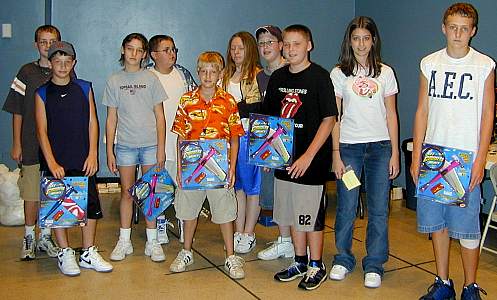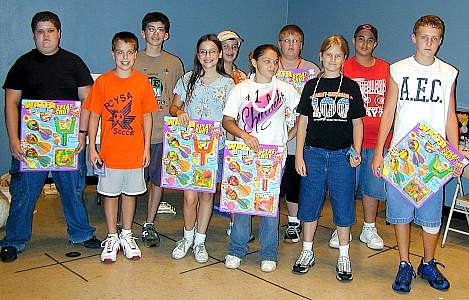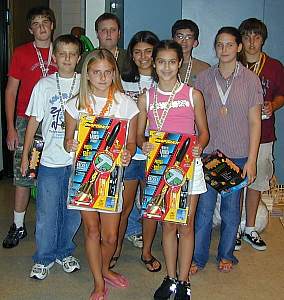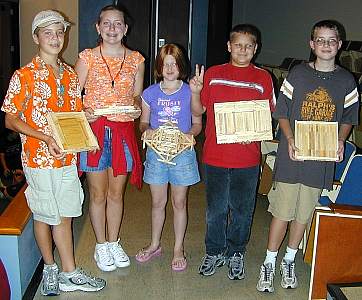Science
Camp 2004
Seventh and Eighth Grade
July
19-23
Class Pictures
Astronomy
Waxing, waning, quarter,
new , full,
crescent and gibbous, all names for the phases of the moon that we
see. Just why does the visible part of the moon
change?
They used diagrams and models to investigate what was going
on.
The students paid close attention and now they know how the positions
of the sun earth and moon cause the phases and I'll bet most
would be able to explain why you can see similar phases when you look
at Venus through a telescope.
Biology
What type are
you? What blood type
that is. The students looked into the process of determining
blood types A, B, O and the Rh factor. They also investigated
their senses and dissected a dogfish shark.
The students tried to find the liver, digestive system, brain,
... Could they figure out whether it was male or
female? What did the skin feel like? What
else did
they notice? They were fascinated.
Chemistry
Physics
Campers had great fun
making
bubbles. Two straws and a length of string will let you make
huge
bubbles. A couple of hula hoops and a shallow pan of bubble
solution can be used to make a bubble that can swallow a
camper. We also made bubbles inside bubbles,
bubbles on a
plate and used pipe cleaners to make weird bubble shapes and found that
bubbles can count, measure angles, and solve complex math
problems. The bubble solution we used was made using 1/4 cup
of
Dawn dishwashing
soap (Joy also works well), 1 tablespoon of glycerin,
and
2.5 cups
of water (use a half cup less if the humidity is high, more if the
humidity is low). We scaled this mix to make gallons of
solution.
The bubbles are fun but not so neat as you can see from the last
picture but the kids all had clean hands,
This week's contests tested
the range of the mini rockets, finding information in an internet
scavenger hunt, and physics
olympic events such as a blindfolded laser maze, periodic table word
search,
toothpick and marshmallow tower, aluminum foil boat and
others.
The big contest was to build a structure out of popsicle sticks and
glue that would catch a steel ball dropped onto it. The ball
must
not break the catcher or bounce out. A formula was used to
determine which one won with weight, height and strength as parameters.
It rained so outdoor activities were canceled during the
early
part of the day. That meant that a couple of the classes
didn't
get to launch their balloons at school. They did
take them
home and I hope that they did manage to try them there. We
offered an assortment of challenges to those classes. They
included the eight queens problem, the game of nim, some paper and
pencil games/puzzels, and some topology problems and mechanical
puzzles.
The
winners





Go
to our Science
Fun page
Go to our Travels page
Go
to our Personal
home page
Go
to our Community
page
If
you would like more information on the camp or the projects and
challenges you can E-mail Nancy
and
Alan